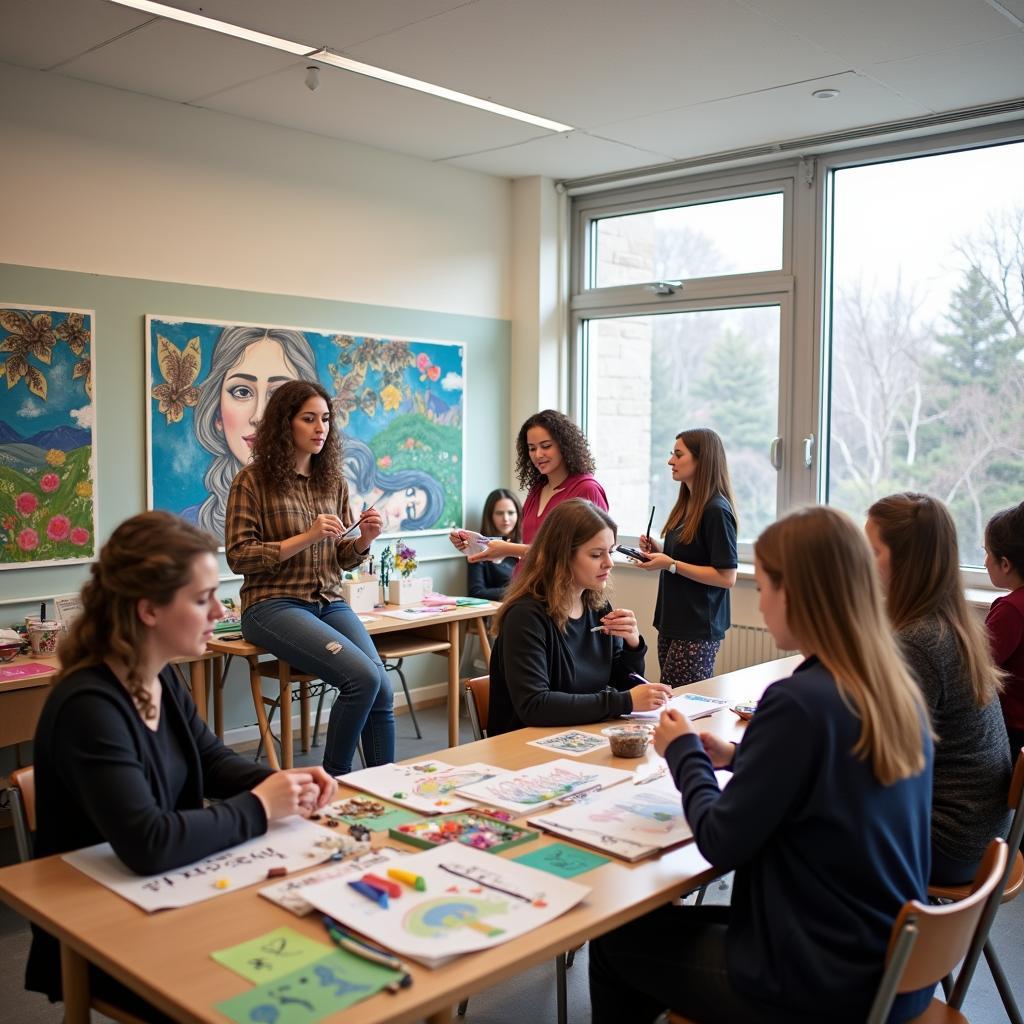Arts education has been a recurring theme in IELTS Writing Task 2, appearing approximately 2-3 times annually since 2019. Based on past exam patterns and current educational trends, this topic is likely to continue featuring prominently in future tests, particularly focusing on arts’ impact on student development and educational outcomes.
Nội dung bài viết
The role of arts education in fostering empathy has become increasingly significant in modern educational discourse. Let’s examine a recent IELTS question on this topic:
Some people think that art subjects such as music, drama and creative writing should be compulsory in secondary school education. To what extent do you agree or disagree with this view?
Question Analysis
This question requires candidates to:
- Take a clear position on mandatory arts education
- Discuss the value of artistic subjects in secondary education
- Support arguments with relevant examples
- Consider potential counterarguments

Band 9 Sample Essay
The inclusion of artistic subjects in secondary education has sparked considerable debate. While some argue these subjects should be optional, I strongly believe that making arts education mandatory would significantly benefit students’ overall development.
Arts education plays a crucial role in developing students’ creativity and emotional intelligence. When teenagers engage in music, drama, or creative writing, they learn to express themselves in diverse ways, helping them understand and process complex emotions during their formative years. For instance, drama classes can help students develop empathy by putting themselves in different characters’ shoes, while music can enhance their ability to work harmoniously in groups through ensemble performances.
Moreover, the role of arts education in promoting creativity extends beyond artistic expression. These subjects foster critical thinking and problem-solving skills that are valuable across all academic disciplines. Creative writing, for example, improves students’ communication abilities and analytical thinking, which are essential in subjects like history and literature. Similarly, music education has been linked to enhanced mathematical understanding due to its inherent patterns and structures.
Furthermore, arts education provides crucial life skills that traditional academic subjects might not address. Through public performances and exhibitions, students develop confidence and overcome stage fright. Group projects in drama and music teach collaboration and leadership skills, preparing students for future professional environments where teamwork is essential.
In conclusion, making arts subjects compulsory in secondary schools would provide students with a more holistic education that nurtures both their academic and personal growth. The benefits clearly outweigh any potential drawbacks, making it a worthy investment in our future generation’s development.
Band 7 Sample Essay
In my opinion, arts subjects should be made compulsory in secondary schools as they offer numerous benefits to students’ development. This essay will discuss the advantages of mandatory arts education.
Firstly, the role of arts and culture in modern education is vital for developing creativity. When students participate in music or drama classes, they learn to think creatively and express themselves better. For example, in my country, schools that have strong arts programs often produce students who are more innovative and confident.
Secondly, arts subjects help students develop important life skills. Drama classes teach public speaking and confidence, while music helps with discipline and teamwork. These skills are useful in many careers and life situations.
However, some people might argue that arts subjects take time away from core subjects like math and science. While this is a valid concern, I believe the benefits of arts education outweigh this disadvantage. Schools can balance the timetable to accommodate both academic and artistic subjects effectively.
In conclusion, making arts subjects mandatory would benefit students by developing their creativity and life skills. Therefore, I strongly support including these subjects in the secondary school curriculum.
Analysis of Band Scores
Band 9 Essay Features:
- Sophisticated vocabulary and complex structures
- Clear organization with coherent arguments
- Excellent use of examples and explanations
- Natural transitions between ideas
- Advanced collocations and precise language
Band 7 Essay Features:
- Good vocabulary with some limitations
- Clear position with adequate support
- Basic but effective organization
- Some good examples but less detailed
- Occasional errors but meaning clear
Key Vocabulary
- Holistic (adj) /həʊˈlɪstɪk/ – comprehensive, complete
- Formative (adj) /ˈfɔːmətɪv/ – influential in development
- Ensemble (n) /ɒnˈsɒmbl/ – group performance
- Inherent (adj) /ɪnˈhɪərənt/ – existing as a natural part
- Nurture (v) /ˈnɜːtʃə/ – help develop or grow
The role of arts education in fostering creativity can be expressed through these advanced sentence structures:
- Complex with relative clause: “Arts education, which encompasses various creative disciplines, fosters critical thinking skills that transcend subject boundaries.”
- Conditional structure: “Were arts education to be made mandatory, students would develop a more rounded skill set.”
- Participle phrase: “Having experienced the benefits of arts education firsthand, many educators strongly advocate for its inclusion in the curriculum.”
We encourage readers to practice writing their own response to this question and share it in the comments section for feedback and discussion.